2008 United States presidential primaries
The 2008 United States presidential primaries were elections conducted by the parties in the United States to determine nationwide candidates for the 2008 United States presidential election .
Since the procedures vary widely depending on the party and state, the primaries are essentially an umbrella term for deciding which candidate will run nationwide. The major parties are a series of elections in all 50 states and other territories of the United States, in which delegates are elected who then decide on the candidate at a national party convention.
Procedure
Each state has its own procedure for carrying out the primaries, which may differ depending on the party. For example, the type of area code is usually the same for both large parties, but the election date and the exact allocation of delegates are different.
The following types of area codes are available:
- In the primaries , as in the actual presidential election, a ballot paper is used to vote. With closed primaries only the registered voters of the party to be voted on and with open primaries the registered voters of all parties are allowed to cast their votes.
- At a caucus , all registered voters of a party meet. The voters split up into groups depending on which candidate they support. The undecided voters are then courted by the individual groups. At the end of the caucus, those responsible count the people in the individual groups and put together the result of the election. Here you have to see this procedure literally, at least with the Democrats: In a corner of the voting hall, for example, B. the supporters of candidate A, in the opposite that of candidate B, etc. With the Republicans, however, a caucus at the end of the day runs like party meetings in this country: The MPs write the name of "their" candidate on a piece of paper at the end is counted. However, there are also differences in this point in the individual states.
- There is also the so-called State Convention , which is a party congress of the state. The two large parties usually only use these meetings to confirm the decisions previously made in the case of primarys or caucuses. In individual states, the party congress itself also decides on some of the delegates. In the smaller parties, these congresses play a larger role, as a general area code was not carried out in all cases.
There are differences between Democrats and Republicans in the number of delegates awarded to a candidate:
- The Democrats have a system that approximates proportionality. This means that each candidate receives the appropriate delegate depending on the result. However, a not inconsiderable proportion of the delegates is not determined by elections; rather, members of the Congress (House of Representatives, Senate), other elected members and party officials automatically have delegate status.
- The Republicans assign delegates either according to the proportional system like the Democrats or according to the "winner takes them all" method. All delegates are awarded to the winner of a preselection.
The states of Iowa and New Hampshire are of particular importance as they are traditionally the first primary and caucus states, respectively, and attract significant media coverage for the respective winner. Therefore, the main goal of most applicants is to achieve a good result in these countries in order to have a promising starting position for the “ Super Tuesday ” on February 5, 2008.
Candidates
Democratic Party
| candidate | image | Office | Exit date | Positions on election campaign issues (English) | Campaign website |
|---|---|---|---|---|---|
| Barack Obama |  |
Senator from Illinois | Presidential candidate | W. | |
| Hillary Clinton |  |
Senator from New York | June 7, 2008 | W. | |
| Mike Gravel |  |
Former Senator from Alaska | March 26, 2008 (change of party) | P | W. |
| John Edwards | 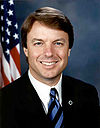 |
Former Senator from North Carolina | January 30, 2008 | ||
| Dennis Kucinich | 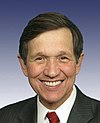 |
Representative from Ohio | January 25, 2008 | ||
| Bill Richardson |  |
Governor of New Mexico | January 10, 2008 | ||
| Joe Biden |  |
Senator from Delaware | January 3, 2008 Vice-President | ||
| Chris Dodd | 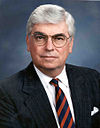 |
Connecticut Senator | January 3, 2008 | W. |
Republican Party
| candidate | image | Office | Exit date | Positions on election campaign issues (English) | Campaign website |
|---|---|---|---|---|---|
| John McCain | 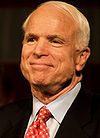 |
Senator from Arizona | Presidential candidate | P | W. |
| Ron Paul |  |
Representative from Texas | June 12, 2008 | W. | |
| Alan Keyes | 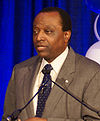 |
Former US Ambassador to the UN from Maryland | April 15, 2008 (party left) | W. | |
| Mike Huckabee |  |
Former Arkansas Governor | March 4, 2008 | P | W. |
| Mitt Romney |  |
Former Massachusetts Governor | February 7, 2008 | W. | |
| Rudolph Giuliani |  |
Former Mayor of New York City | January 30, 2008 | ||
| Fred Thompson | 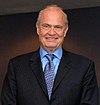 |
Former Senator from Tennessee | January 22, 2008 | ||
| Duncan Hunter |  |
California MP | January 19, 2008 | P | W. |
Green party
Nominations Convention, July 10-13 in Chicago , Illinois .
| candidate | image | Office | Vice presidential candidate | Campaign website |
|---|---|---|---|---|
| Cynthia McKinney |  |
Former member of the House of Representatives | Rosa Clemente |
Constitution Party
Nomination Convention on April 26, 2008 in Kansas City , Missouri .
| candidate | Office | Vice presidential candidate | Campaign website |
|---|---|---|---|
| Chuck Baldwin | Priest, radio host, and party's vice-presidential candidate in 2004 | Darrell Castle |
Libertarian party
Nomination Convention on May 25, 2008 in Denver , Colorado .
| candidate | image | Office | Vice presidential candidate | Campaign website |
|---|---|---|---|---|
| Bob Barr | 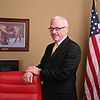 |
Former Georgia Republican Congressman, attorney | Wayne Allyn Root | W. |
The Democratic presidential candidate Mike Gravel , whose election campaign went largely unnoticed, had tried to nominate the Libertarian Party after he left the party. After his failure, he announced the end of his political career.
Bob Barr is the first member of the House of Representatives to run for a third party president since the 1988 presidential election. He is seen as an alternative for conservative voters who cannot make friends with McCain, who is considered to be moderate.
Prohibition Party
Nomination Convention on September 14, 2007 in Indianapolis , Indiana .
| candidate | Office | Vice presidential candidate | Campaign website |
|---|---|---|---|
| Gene Amondson | Priest and party's presidential candidate in 2004 | Leroy Pletten | W. |
Socialist Party USA
Nomination Convention on October 20, 2007 in St. Louis , Missouri .
| candidate | Office | Vice presidential candidate | Campaign website |
|---|---|---|---|
| Brian Moore | Healthcare manager | Stewart Alexander | W. |
Socialist Workers Party
| candidate | Office | Vice presidential candidate | Campaign website |
|---|---|---|---|
| Róger Calero | journalist | Alyson Kennedy | W. |
Róger Calero was not born in the United States and is also not an American citizen. For constitutional reasons, he cannot become president, and his candidacy would not be possible in many states. His party made do in the previous election, when Calero was also a candidate, by including the 2000 candidate, James Harris, as a candidate on the ballot paper. However, even if there is a majority among the electorate, Calero will not be able to be elected president.
Independent candidates
The Mayor of New York City , Michael Bloomberg , conducted a voter analysis in all 50 US states and was considered a potential non-party candidate, but decided against running for the White House in late February 2008.
On February 24, 2008, Ralph Nader announced that he would be entering the presidential campaign as an independent candidate. The consumer advocate had run for the White House in 2000 and 2004 and received 2.7% and 0.4% of the vote, respectively. Nader wanted to put the issues of environmental protection and safety in the workplace at the center of his election campaign.
| candidate | Office | Vice presidential candidate | Campaign website |
|---|---|---|---|
| John Taylor Bowles | Shopkeeper, National Socialist Order of America | Matthew Ramsey | W. |
| Jackson Kirk Grimes | United Fascist Union | W. | |
| Frank Moore | Performance artist | Susan Block | W. |
| Ralph Nader | Consumer advocate, multiple presidential candidate | Matt Gonzalez | W. |
| Jonathon Sharkey | Boxer, Wrestler and Satanist, Vampires, Witches and Pagan Party |
course
Democratic primaries
Starting position
In December 2007, Hillary Clinton was still clearly ahead of Barack Obama with 27% and John Edwards with 15% in national polls with 45%, before Clinton suffered heavy losses in January after the elections in Iowa. The January polls showed Clinton and Obama head to head with 33% each and Edwards with 20% also with significant gains.
Before Super Tuesday
In Iowa , Obama garnered the most votes in the first primaries, well ahead of Edwards and Clinton, even though Clinton was more than 10% ahead of Obama and Edwards in the fall of 2007. In a survey carried out in November 2007, Obama was finally ahead of Clinton for the first time and has continuously expanded his lead from then on. Joe Biden and Chris Dodd announced their retirement from the election campaign after their defeats in Iowa.
In New Hampshire , where the January 8th primary took place, Obama failed to repeat his Iowa victory. After Clinton's lead had been reduced from originally more than 20% to a few percentage points at the end of December, some polls carried out after the Iowa Caucus showed Obama already around 10% ahead of Clinton. According to Forecast Market , which correctly predicted the outcome in Iowa, the likelihood of Obama winning the New Hampshire primaries was over 90 percent. Despite everything, Clinton ended up just ahead of Obama. In the evening, Obama gave a speech that a little later the rapper will.i.am turned into a music video entitled Yes We Can and which became an unexpected success on the Internet.
In Nevada , Clinton won the January 19 primary with 51% of the vote. Its strongest competitor Obama came in second with 45%, although many expected him to win, as the influential Culinar Union spoke out in favor of him. Because of the proportional distribution of votes by district, Obama from Nevada got one more delegate vote than Clinton. John Edwards only won 4% of the vote.
In South Carolina , the fourth electoral state for the Democrats, Obama was able to score a clear victory with over 55% against his fiercest rival Hillary Clinton, who came in at 27%. John Edwards received 18% of the vote in his country of birth. Obama owes his victory mainly to the black voters, 80% of whom voted for him.
In Florida , Clinton was able to achieve a clear victory with 50% against Obama, who came to 33%. However, no delegates were distributed because Florida held the primaries before February 5, violating party rules. Following the Florida primary, John Edwards withdrew his candidacy.
Super Tuesday
Clinton and Obama's head-to-head race continued in the February 5, 2008, Democratic primaries in 21 states and American Samoa . According to projections, Obama won more states, but since Clinton was able to prevail in populous states like California, she won more delegate votes. Thus, Super Tuesday did not bring any preliminary decision to the Democrats.
After Super Tuesday
In Nebraska , Washington and Louisiana , Obama won on February 9th. He also won in the US Virgin Islands outskirts. Contrary to expectations, Obama was also able to win in Maine on February 10th and has taken the lead in the delegate votes at the latest since the subsequent victories in Maryland , Virginia and Washington, DC . He also won the Wisconsin primary on February 19, 17% ahead of his rival Hillary Clinton, and in Hawaii he got more than three-quarters of all votes.
March
After Obama's eleven victories in a row, many commentators had predicted that Clinton's campaign could no longer be saved because Obama was also in states with generally Clinton-centric demographics such as B. Wisconsin was able to catch up with significant arrears. In addition, Clinton's appearances in recent television debates were judged mixed. Furthermore, Obama was able to collect considerably more donations. Clinton must therefore win the delegate-rich states of Ohio and Texas by a clear margin on March 4th in order to get into the race again. She succeeded in doing so, and in Rhode Island , too , she won more votes than Obama. He could only win the Vermont area code that day . Therefore, March 4th was counted as a comeback for Clinton. However, it later emerged that Texas was not clearly going to Clinton. In Texas, an area code that determined around two thirds of the delegates and a caucus that determined around one third of the delegates took place in parallel. Since Obama won the caucus, according to the preliminary results, he received even more delegates than Clinton. Ultimately, the distances between the number of delegates remained almost the same. Clinton was ahead in the polls, but days later the lead melted back into a stalemate.
Obama won both of the primaries that remained in March: In Wyoming , the most populous state, there were only twelve delegates available, but because of the tension in the race, the state received unusual attention. Obama was able to win there by over 20 percentage points. The result was just as clear on March 11th in Mississippi , where Obama won 61% over Clinton.
April
This was followed by a six-week segment with no area code, during which the harshness of the election campaign increased further. In the absence of further results, public perception shifted to observing surveys and possible mistakes made by the candidates. Obama's polls collapsed when it became known that he had long been a member of the congregation of controversial preacher Jeremiah Wright . Hillary Clinton was able to catch up in the polls at times. Obama responded with a high-profile speech on the racial issue in the United States. After that, Obama's lead was restored. Clinton stumbled upon a statement describing her visit to Bosnia as First Lady in 1996. There she had claimed that they had to run with their heads bowed at the Tuzla airfield in order not to be a target for snipers. However, the arrival videos showed Clinton smiling and shaking hands. She then had to admit that she had exaggerated. The dismissal of her advisor Mark Penn and the financial problems of her campaign also made waves. Shortly before the April 22 primary in Pennsylvania , Obama got into trouble again when a statement by him came into the public eye that he said the ordinary working class was bitter. The candidates meanwhile continued to campaign for the super delegates. Clinton was able to stay ahead there, even if their lead melted significantly.
Despite all the confusion, none of the candidates fell in the polls. Ultimately, the election on April 22nd in Pennsylvania was as important as the March 4th elections, so that Clinton had to get a clear victory there in any case in order to remain credible in the election campaign. She managed to win by 10 percentage points over Obama.
May
The long pre-election campaign increasingly caused signs of fatigue and bitterness. It became clear that Obama could not score with certain sections of the population, especially the white middle class, so that Clinton repeatedly won states in which these groups are particularly strong. Although Obama was clearly in the lead, his lead was not enough to make Clinton impossible to win. Clinton, on the other hand, was not ready to give up.
Caucuses took place in Guam on May 3rd, but only eight half delegate votes were given. Both candidates received four each. The last major election day was May 6 in North Carolina and Indiana . On that day, 187 delegates were available. Barack Obama was able to score a clear victory in North Carolina despite the controversy over the statements of his former pastor Jeremiah Wright, while Hillary Clinton only narrowly won in Indiana.
On May 14, 2008, former Democratic presidential candidate John Edwards announced his support for Barack Obama in Grand Rapids .
The elections on May 20 ended again in two. In Kentucky , where Clinton's core constituency is a large part of the population, she won by 36 percentage points. In the Oregon election, however, Obama won by 18 percentage points.
In the course of May, the turning point among the super delegates became apparent. For a long time they had supported Hillary Clinton by a large majority, but many had not yet declared themselves at all. Now this lead melted down further and further. In mid-May there were the first reports that Obama had caught up with Clinton. By the end of the month, Obama was also clearly in the lead with the superdelegates.
June
Efforts by Hillary Clinton's team continued throughout the spring to admit delegates from Florida and Michigan to the convention. The delegates had been stripped of these states because they had illegally held their elections before February 5th. Furthermore, the candidates were urged not to campaign there. Obama also removed his name from the Michigan candidate list and recommended that those who wanted to vote for him vote “Uncommitted”. Clinton clearly won both elections and argued that the party's approach was undemocratic in favor of delegates' full voting rights. But this was very controversial as it would have favored Clinton. Proposals ranged from full crediting to a new election. In Michigan, however, such considerations were rejected. The dispute was not settled until early June when the Democratic Party's rules committee decided to allow delegates to participate, but only with half the voting rights. This is similar to the Republican sanction, which also halved delegate votes from primaries held too early. Furthermore, the "Uncommitted" votes from Michigan were counted for Obama. Although Clinton caught up with it, the decision was generally seen as a defeat for them, as it became almost hopeless to catch up with Obama's lead. The Clinton team reserved the right to appeal.
In the primaries in Puerto Rico on June 1, however, she won again by a considerable margin. The final primaries were held on June 3 in Montana and South Dakota . Although Obama's win had been predicted in both states, Clinton surprisingly won in South Dakota.
On the same day, Obama also passed the 2,118 delegate mark required for a nomination. The media now lead Obama as a “presumptive nominee” (“candidate-designate”).
Clinton did not initially admit defeat. On June 4, she visited her campaign team in Arlington and told them that as of Friday, she would no longer need their services. An official announcement said she would declare her support for Barack Obama on June 7th.
July
In order to counter the allegations that he had no experience in foreign policy, Barack Obama went on a trip abroad, during which he also gave a widely acclaimed speech at the Victory Column in Berlin on July 24th .
August
On August 13, Arkansas super delegate and party leader Bill Gwatney was shot dead in the Little Rock Democratic campaign office . He was considered a close friend of Hillary Clinton.
On August 23, it was announced that Barack Obama had chosen Joe Biden as the vice-presidential candidate.
The convention was held in Denver , Colorado , August 25-28 . The speeches by Hillary and Bill Clinton were eagerly awaited as the task was to win over the supporters of the narrowly defeated candidate Clinton for the support of Barack Obama. Both supported Obama. Hillary Clinton moved while the delegate vote was being counted that Barack Obama be acclaimed as a candidate for president. This was accepted. At the end of the party conference, Barack Obama gave a speech in front of 80,000 people, which was received very positively by various commentators.
Republican primaries
In early 2007, Rudy Giuliani, the former mayor of New York City , was still the undisputed favorite of the Republicans according to national polls. In March, for example, his lead over the then runner-up John McCain was around 20%. The growing popularity of Mitt Romney and Fred Thompson's candidacies led to a four-way battle for the nomination in the second half of the year. In Iowa, Mike Huckabee was able to grow strongly in opinion polls in early December, which turned into national leadership for the first time after his victory at the party meetings there in January 2008. However, Senator John McCain, who had long been considered an outsider, soon took the lead in the polls.
In the states in which the first primaries were held, there was initially no favorite:
While Mike Huckabee was able to win well ahead of Mitt Romney in Iowa, McCain was able to win the state of New Hampshire ahead of Mitt Romney after strong gains in December and January. On January 5, a primary was also held in Wyoming, but as the second caucus in the primary, it met with little interest from candidates and the media. Romney won this clearly, as did the primaries in Michigan and Nevada, where he was the only candidate of his party to campaign. On January 19, John McCain won the South Carolina primary just ahead of Mike Huckabee, and on January 29, just ahead of Mitt Romney in Florida. Rudy Giuliani had deliberately opted for a risky strategy by skipping the first primaries and instead campaigning in Florida . He had assessed his chances in the early pre-election states rather weak and hoped to be able to attract the numerous residents of Florida who immigrated from New England to his side. However, this turned out to be a big mistake as it was barely noticed in the media. He only reached third place and then withdrew his candidacy. He spoke out for McCain. Mitt Romney won the less-noticed primary in Maine by a large margin over John McCain.
On Super Tuesday , February 5, 2008, Republican primaries were held in a total of 21 states. John McCain was able to confirm his role as favorite with victories in nine states, including California and New York. His rivals Mitt Romney and Mike Huckabee won in seven and five states respectively, but collected significantly fewer delegate votes than McCain. After Super Tuesday , Mitt Romney announced the end of his presidential bid. McCain won the primary elections in the states of Virginia and Maryland as well as in the capital Washington, DC on February 12, and was able to extend his lead in the delegate votes.
Although Mike Huckabee was clearly behind after Super Tuesday and has not won another primary since then, he did not give up his candidacy. On March 4, after victories in Texas , Ohio , Vermont and Rhode Island , John McCain reached the required number of 1,191 delegates and has been a candidate for president ever since. Mike Huckabee withdrew his candidacy that day.
Only two other candidates remained, Ron Paul and Alan Keyes. The latter is considered a permanent candidate and led his election campaign without significant public interest. On April 15, he finally announced his resignation from the Republican Party. He expressed interest in converting to the Constitution Party , but made no clear statement as to whether he is seeking the presidential nomination of that party. Ron Paul was already traded as a candidate for the Libertarian Party , for which he ran as a candidate in 1988. However, he continued to campaign actively, although at this point he had no chance. Ultimately, he only announced his waiver after all the primaries had been completed.
On August 29th, John McCain announced that Alaska State Governor Sarah Palin would become his runner-up candidate. Although this was considered inexperienced, it was popular with the party's conservative base. However, details of her résumé and private environment were soon revealed, which aroused increased criticism. The unmarried minor daughter Bristol was pregnant; Palin is one of the supporters of abstinence campaigns. In addition, there was a case of nepotism against them .
The Republican Convention from September 1-4 in Saint Paul, Minnesota was also overshadowed by Hurricane Gustav . Out of piety towards the victims and the ongoing evacuation, the first day was limited to the formalities. However, the first lady Laura Bush and Cindy McCain , the wife of the presidential candidate John McCain , appeared together. The eagerly awaited speech by Vice-Presidential candidate Sarah Palin on September 3rd was cheered by delegates. The nomination was officially carried out on the same evening.
Results
→ Main article: 2008 presidential election results in the United States
Delegates
A state delegate is divided among candidates based on the results in the primaries. The delegates elect their party's presidential candidate at national party conventions. With the Democrats there is the special feature of the Superdelegates (SDG). These are delegates who are not included in the primaries. Usually these are incumbents and party officials who already support the party favored candidate. The Republicans, on the other hand, know obligated and unconditional delegates (uD). Of the 4,234 (formerly 4,050) Democratic delegates, 3,438 (formerly 3,253) are committed delegates and 797 are super-delegates. The Republicans have 2,380 delegates, including 1,917 obligated delegates and 463 non-obligated delegates. 123 of the optional delegates are members of the Republican National Convention (RNC).
Obama won enough delegates to secure his nomination. Hillary Clinton remains a candidate for the time being and has not yet withdrawn her application (as of June 4, 8:03 am CET). She only withdrew her candidacy on June 7, 2008.
| Democrats (4,234) | Republican (2,380) | ||||||
|---|---|---|---|---|---|---|---|
| candidate | Elected delegates |
Super delegate | total | candidate | Elected delegates |
Non-obligated delegates |
total |
| Barack Obama | 1,761 | 393 | 2.154 | John McCain | 1,432 | 85 | 1,517 |
| Hillary Clinton | 1,636 | 287 | 1.923 | Mike Huckabee | 272 | 3 | 275 |
| John Edwards | 13 | 0 | 13 | Mitt Romney | 255 | 0 | 255 |
| Ron Paul | 30th | 0 | 30th | ||||
| still to be forgiven | 115 | 179 | 294 | still to be forgiven | 0 | 0 | 320 |
| Winner needs 2,118 | Winner needs 1,191 | ||||||
The information on superdelegates and non-obligated delegates refer to non-binding statements of support, so-called endorsements , that they have made. Those who have not yet made such a declaration are listed under “To be forgiven”. However, the final voting behavior of these groups of delegates may differ from previous expectations, as they can change camp at any time.
A final result cannot be determined for the Democrats either, since Barack Obama was elected by acclamation. So there was no vote count.
credentials
- ^ About the Primary - Caucus - Convention System
- ↑ CNN Politics: RESULTS February 5 - SUPER TUESDAY
- ↑ sueddeutsche.de: USA: Clinton ends election campaign: "I give him my full support"
- ↑ Declared the conversion to the Libertarian Party and will try to get the nomination for the presidential candidate there. - ( Memento of the original from March 26, 2008 in the Internet Archive ) Info: The archive link was automatically inserted and not yet checked. Please check the original and archive link according to the instructions and then remove this notice.
- ↑ SPIEGEL ONLINE: Democrat Edwards gives up - duel between Obama and Clinton
- ↑ Welt-Online: Democrat Kucinich gets out of US presidential race
- ↑ US media: Presidential candidate Richardson gives up
- ↑ a b Biden Abandon's Presidential Bid ( Memento of the original from August 9, 2011 in the Internet Archive ) Info: The archive link was automatically inserted and not yet checked. Please check the original and archive link according to the instructions and then remove this notice.
- ↑ a b Dodd Leaves Presidential Race ( Memento of the original from August 9, 2011 in the Internet Archive ) Info: The archive link was automatically inserted and not yet checked. Please check the original and archive link according to the instructions and then remove this notice.
- ^ CNN.com: Paul suspends presidential campaign; forms new organization ( page no longer available , search in web archives ) Info: The link was automatically marked as broken. Please check the link according to the instructions and then remove this notice.
- ↑ a b Alan Keyes to announce break with GOP in Hazleton, PA (English) ( Memento of the original from May 14, 2008 in the Internet Archive ) Info: The archive link was automatically inserted and not yet checked. Please check the original and archive link according to the instructions and then remove this notice. . The announcement that Keyes would make a public speech to mark his departure from the party on April 15 was released on April 13. The official conversion, however, probably took place earlier, as Keyes 'website already contained references to his likely new party, the Constitution Party , and unofficial information was made public at the end of March ( third party about Alan Keyes' exit from the party ).
- ↑ CNN.com: John McCain becomes Republican presidential candidate
- ↑ Reuters Germany: Romney drops out of US presidential race ( page no longer available , search in web archives ) Info: The link was automatically marked as defective. Please check the link according to the instructions and then remove this notice. Thu Feb 7, 2008 7:36 am CET
- ↑ a b (January 30, 2008): Giuliani gives up - and promotes McCain
- ↑ ABCNews (January 22, 2008): Fred Thompson Drops Presidential Bid
- ↑ CNN Political Ticker (January 19, 2008): Hunter exits presidential race
- ↑ Associated Press, "Libertarian Party picks Barr as presidential candidate", May 25, 2008 ( Memento of May 26, 2008 in the Internet Archive )
- ↑ HANDELSBLATT The Third Man builds before Thursday, January 10, 2008, 4:36 pm
- ↑ Billionaire Bloomberg doesn't want to go into the White House
- ↑ Ralph Nader wants to be president of Welt Online again
- ↑ Associated Content ( Memento of the original from May 25, 2012 in the web archive archive.today ) Info: The archive link was automatically inserted and not yet checked. Please check the original and archive link according to the instructions and then remove this notice.
- ↑ a b Reuters : "Obama and Huckabee win first 2008 vote" (January 3, 2008)
- ↑ Rasmussen Reports: Election 2008: New Hampshire Democratic Primary ( Memento of the original from February 9, 2008 in the Internet Archive ) Info: The archive link was automatically inserted and has not yet been checked. Please check the original and archive link according to the instructions and then remove this notice.
- ↑ Rasmussen Markets: Winner of 2008 Democratic New Hampshire Primary ( Memento of the original from December 22, 2008 in the Internet Archive ) Info: The archive link was inserted automatically and has not yet been checked. Please check the original and archive link according to the instructions and then remove this notice. - last accessed on January 7, 2008
- ↑ Clinton wins in Nevada
- ↑ Obama vies for dishwasher, Huckabee for Jesus fans
- ↑ Clinton won more votes, Obama won more delegates
- ↑ Barack Obama triumphs in the US state of South Carolina
- ↑ McCain wins in Florida on n-tv.de.
- ↑ Tagesschau : Super uncertainty after Super Tuesday (tagesschau.de archive) from February 6, 2008.
- ↑ Obama wins in 3 states ( Memento of the original from February 13, 2008 in the Internet Archive ) Info: The archive link was inserted automatically and has not yet been checked. Please check the original and archive link according to the instructions and then remove this notice. Obama blog
- ↑ Euronews: Barack Obama continues pre-election triumph - McCain confirms Republican favorite
- ↑ Obama takes tenth victory in a row - Clinton voters overflow
- ↑ SPIEGEL Online: Clinton wins important primaries in Ohio and Texas - setback for Obama
- ↑ SPIEGEL Online: Showdown in the cradle of the nation
- ↑ Der Tagesspiegel: http://www.tagesspiegel.de/politik/international/US-Vorwahl;art123,2489832
- ↑ SPIEGEL Online: Obama outclasses Clinton in Wyoming
- ↑ SPIEGEL Online - Obama wins in Mississippi - Clinton falls behind
- ↑ The Survival Artist, FAZ.net, March 30, 2008
- ↑ "I made a mistake", SPIEGEL Online, March 25, 2008
- ^ Hard times for Barack Obama, Frankfurter Rundschau Online, April 21, 2008
- ^ "Victory in Pennsylvania - Clinton draws new hope in the Democratic duel", SPIEGEL Online, April 23, 2008
- ↑ “Obama outstrips Clinton”, SPIEGEL Online, May 10, 2008
- ^ Obama Pulls Ahead of Clinton in Superdelegates, The New York Times, May 10, 2008
- ^ Süddeutsche Zeitung: Increasingly hostile
- ^ No redial in Michigan, NZZ Online, April 6, 2008
- ^ "New defeat for Hillary Clinton", SPIEGEL Online, June 1, 2008
- ↑ "Obama will be the first black US presidential candidate", SPIEGEL Online, June 4, 2008
- ↑ sueddeutsche.de: USA: Clinton ends election campaign: "I give him my full support"
- ↑ Arkansas Democratic Party leader shot dead , FAZ.net, August 14, 2008
- ↑ Party leader of the US Democrats shot dead in Arkansas , Spiegel-Online, August 13, 2008
- ^ Republican Presidential Nomination
- ^ Iowa, NH Overshadow Wyoming Caucus
- ↑ Romney wins area code in Wyoming ( Memento from January 7, 2008 in the Internet Archive )
- ↑ Reuters : "WRAPUP 6-US Republican Romney wins Michigan primary" (January 15, 2008)
- ↑ today journal : "Nevada: Romney wins the Republican area code" (January 19, 2008) ( page no longer available , search in web archives ) Info: The link was automatically marked as defective. Please check the link according to the instructions and then remove this notice.
- ^ New York Times : "Campaigns Face Common Foe in Nevada: Confusion" (January 19, 2008)
- ^ McCain wins in S. Carolina over Huckabee's evangelical surge
- ↑ CNN : "Election Center 2008 Primary and Caucuses" (as of January 29, 2008)
- ↑ heute-journal : “Respect for Romney in Maine” (February 3, 2007) ( page no longer available , search in web archives ) Info: The link was automatically marked as broken. Please check the link according to the instructions and then remove this notice.
- ^ CNN : McCain the big winner; Huckabee shines February 6, 2008.
- ↑ Euronews: US primaries: McCain expands favorites
- ↑ SPIEGEL Online: McCain makes the presidential candidacy clear
- ↑ n-tv.de: Super delegates & Co.
- ↑ SPIEGEL ONLINE: Clinton's next hope destroyed
- ↑ "I give him my full support" , Sueddeutsche Online from June 7, 2008